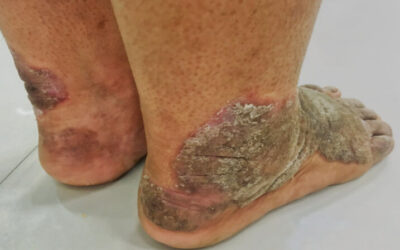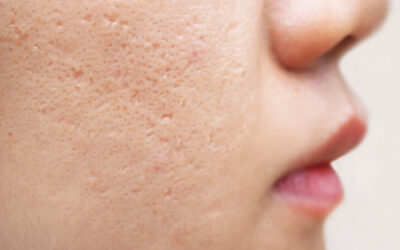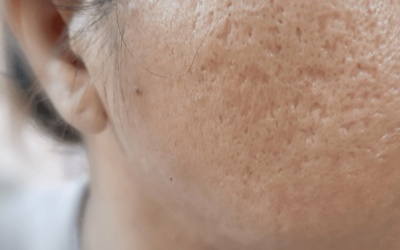There is actually a difference between eczema and psoriasis. Yet, many people are confused about the two conditions. In this blog post, we will discuss the differences between eczema and psoriasis, as well as their respective treatments. We will also explore whether or not stress can cause eczema or psoriasis and where you can visit Skin Cancer Specialists.
What is the difference between psoriasis and eczema?
Psoriasis is a chronic, inflammatory skin condition that can cause dry, itchy, and red skin. However, psoriasis differs from eczema in a few key ways.
First, psoriasis often results in the formation of scaly patches on the skin known as plaques. Second, psoriasis typically affects adults, although it can occasionally be seen in children. Finally, while there is no cure for psoriasis, the condition can be managed with medication and lifestyle changes.
Eczema is also a chronic, inflammatory skin condition that results in dry, itchy, and red skin. Eczema is often seen in children, but it can also affect adults. There is no cure for eczema, but the condition can be managed with medication and lifestyle changes.
So, how exactly do they differ? The main difference is that eczema results in dry, itchy skin, while psoriasis often causes the formation of scaly patches on the skin, known as plaques.
Causes of the Diseases
Despite being two different conditions, eczema and psoriasis share an important characteristic. The immune system is involved in these conditions in distinct ways. However, because both conditions can have other causes, neither is considered a legitimate autoimmune illness.
Psoriasis
Psoriasis is caused by an overactive immune system. In people with psoriasis, the immune system mistakenly attacks healthy skin cells. This results in the overproduction of skin cells, which leads to the formation of plaques.
Eczema
The exact cause of eczema is unknown, but it is thought to be related to a combination of genetic and environmental factors. For example, eczema is more common in people with a family history of the condition and is often triggered by environmental irritants such as soaps, detergents, and pollen.
Psoriasis vs. Eczema Symptoms
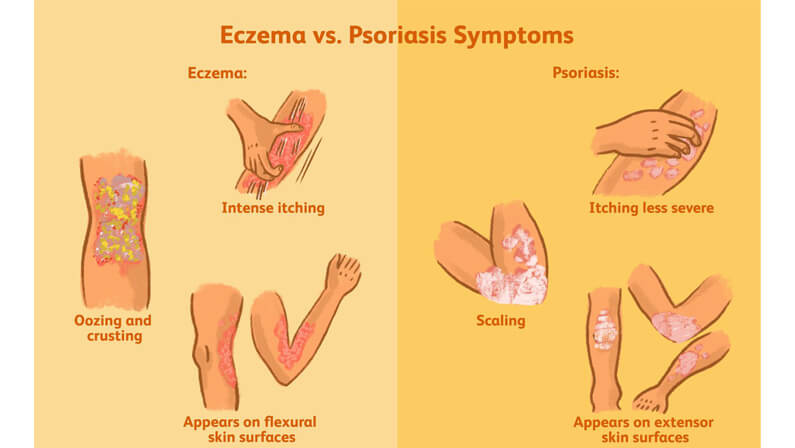
Both skin diseases can appear anywhere on your body but they have their own favorite areas. Psoriasis commonly causes troubles on the scalp, elbows, knees, buttocks, and face. Eczema can also occur in those places, but it most often inflames the skin on the back of the knees or the inside of the elbows.
The symptoms of both conditions can vary depending on the individual, but they typically include dry, itchy skin.
Specific symptoms include:
Psoriasis
- Scaly patches on the skin
- Dry, itchy skin
- Red, inflamed skin
Eczema
- Dry, itchy skin
- Red, inflamed skin
- Cracking and bleeding skin
Triggers for Psoriasis and Eczema
Both conditions have similar triggers, which can include:
Psoriasis
There are a variety of triggers that can cause psoriasis flare-ups, including infections, injuries to the skin, stress, and certain medications.
Eczema
Like psoriasis, eczema can be triggered by infections, injuries to the skin, stress, and certain medications. Eczema can also be triggered by products that irritate the skin, such as soaps, detergents, disinfectants, and more. In addition, eczema may also be triggered by environmental factors such as dry weather, humidity, and temperature changes.
Psoriasis and Eczema Difference in Diagnosis

For a proper diagnosis, it is always best to consult with dermatologists or skin cancer specialists.
These conditions are diagnosed through:
Psoriasis
There is no one test that can be used to diagnose psoriasis. Instead, diagnosis is typically based on a review of symptoms and a physical examination. In some cases, a skin biopsy may also be conducted.
Eczema
Similarly, eczema cannot be diagnosed with one test. The diagnosis is typically based on a review of symptoms and a physical examination. In some cases, a skin biopsy may also be conducted.
Psoriasis vs. Eczema Risk Factors
Like any other condition, several risk factors can contribute to the development of each condition, such as:
Psoriasis
- Stress
- Skin injury
- Certain medications
- Viral and bacterial infections
- Family history
- Obesity
- Tobacco
- Alcohol
- Cold temperatures
- Race
Eczema
- Family history of eczema
- Stress
- Certain medications
- Irritants such as soaps and detergents
- Dry weather
- Lifestyle
- Humidity
- Temperature changes
- Environment
How Psoriasis and Eczema Feel Different
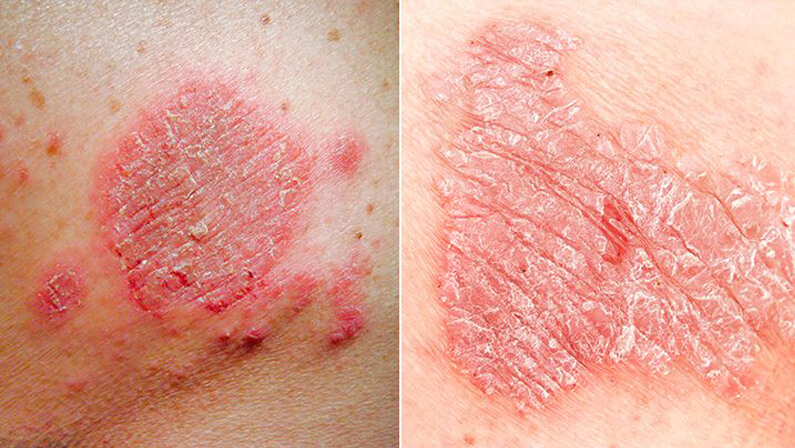
The dry rashes of eczema and psoriasis can initially resemble one another. The identical symptoms of these two illnesses can often be distinguished from one another when you pay great attention.
Skin which has eczema is irritated and red. It could be crusty, leaking, or scaly. You might notice uneven, leathery spots that are occasionally dark. Swelling may also result from it.
Red patches can also result from psoriasis. They could have elevated, scaly, and silvery skin. The skin is thicker and more irritated than it is with eczema, though, if you examine it closely.
Where do they show up?
These skin conditions are frequently distinguished from one another by the location of rashes on the body.
In the skin folds of the body, notably along the creases of the elbows, knees, wrists, neck, and ankles, eczema symptoms most frequently manifest themselves, especially in children. Additionally, the chin, cheeks, scalp, chest, arms, and legs might develop eczema in infants. Adults are more prone to experience symptoms on hands or facial skin areas.
Although psoriasis can develop anywhere on the body, the outside edges of the elbows, knees, scalp, palms, lower back, soles of the feet, ears, mouth, eyelids, buttocks, or nails are more likely to develop the condition.
At what age do they start?
Both eczema and psoriasis can afflict persons of any age. However, psoriasis often develops later in life, frequently between the ages of 15 and 35, whereas eczema typically initially manifests in infants and children. Indeed, Eczema is far more common in children than psoriasis.
Almost only 1% of children, according to the American Academy of Dermatology, and other specialists, have psoriasis, which is uncommon in babies. While psoriasis typically persists throughout one’s lifetime, children with eczema may find that the symptoms lessen or disappear as they age.
What other conditions are they linked to?
Being diagnosed with psoriasis and eczema make them at greater risk for various conditions, including:
Psoriasis
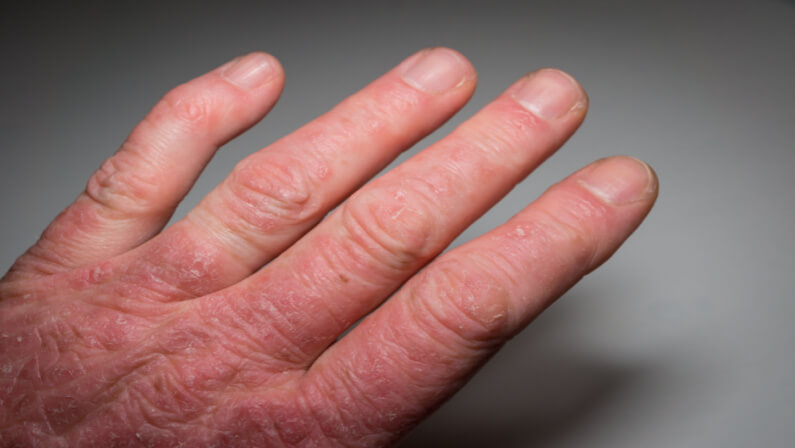
- Psoriatic arthritis (causes pain, stiffness, and swelling in and around the joints)
- Obesity
- Type 2 diabetes
- High blood pressure
- Temporary skin color changes where plaques have healed
- Eye conditions, such as conjunctivitis, blepharitis, and uveitis
- Cardiovascular disease
- Other autoimmune diseases, such as celiac disease, sclerosis, and Crohn’s disease
- Mental health conditions, such as low self-esteem and depression
Eczema
- Asthma
- Hay Fever
- Allergic Rhinitis
- Food Allergies
- Infections
- Mental health conditions, such as depression and anxiety
Psoriasis vs Eczema Treatment
There is no cure for either eczema or psoriasis, but both conditions can be managed with medication and lifestyle changes. Some common treatment options include:
Psoriasis
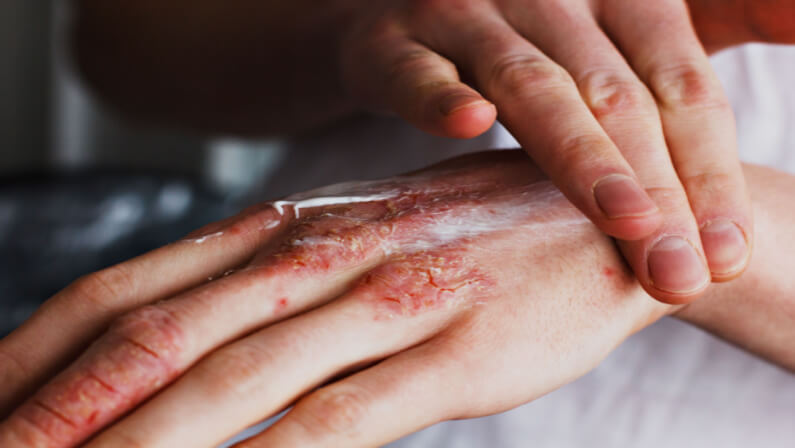
Psoriasis doesn’t have a cure, but with the right care, its symptoms can be controlled. Most likely, a combination of prescription drugs, over-the-counter medicines, light treatment, and dietary changes will be used to treat psoriasis.
One of the most popular ways to treat psoriasis is with topical medicines. To assist delay skin growth and lessen inflammation, thin layers of retinoids like Tazorac, corticosteroid creams like Sernivo and Triderm, vitamin D analogs, and calcineurin inhibitors can be applied to the affected areas. Coal tar and aloe extract cream are two other natural treatments that can be used topically to treat psoriasis.
Eczema
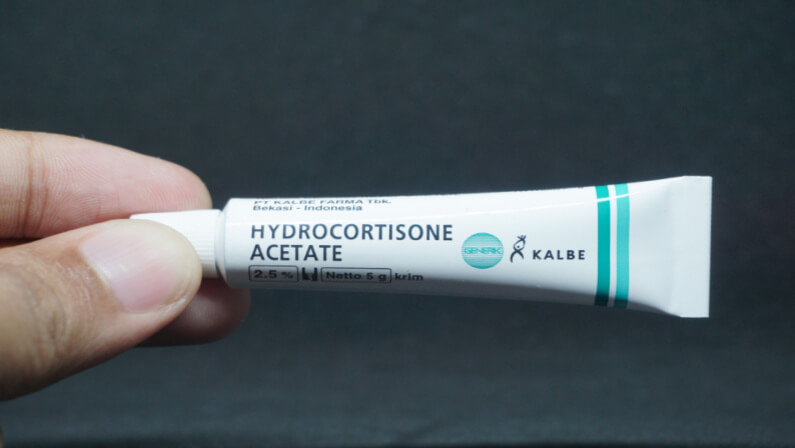
Eczema currently has no known cure, although, for the majority of people, its symptoms can be successfully treated. Plans for treating eczema frequently include prescription drugs, light therapy, home treatments, and dietary adjustments.
The most popular form of treatment for eczema is a topical medication, which includes hydrocortisone creams, NSAID creams, and calcineurin inhibitors like Protopic and Elidel. They function by regulating the immune system and reducing inflammation.
If you’re looking for a skin cancer specialist in Houston, Sugar Land, Katy, and Conroe, you can book an appointment with Skin Cancer Specialists.
Psoriasis and Eczema Prevention
There is no way to prevent eczema or psoriasis, but there are some things that can be done to lessen the chances of a flare-up, such as:
- Avoiding known triggers, like infections, emotional stress, skin injuries, dry skin, certain medications, and alcohol
- Keeping skin moisturized with lotions or creams
- Using mild soaps and detergents
- Avoiding excessive sun exposure or using tanning beds
- Managing stress
Can you have both psoriasis and eczema?
It is possible to have both psoriasis and eczema at the same time, albeit it is uncommon.
Can you treat psoriasis and eczema the same way?
Some medicines used to treat psoriasis may also be used to treat eczema and vice versa. However, this does not always imply that there is a single, universally effective course of treatment for both illnesses. A dermatologist or skin cancer specialist can assist you in determining the best course of treatment for you based on your unique symptoms and medical background.
Consult With an Expert
Eczema and psoriasis are two distinct conditions that can often be confused with one another. They both involve chronic inflammation of the skin, which can lead to redness, itching, and flaking. Psoriasis is an autoimmune condition that causes the skin cells to grow too quickly, while eczema is thought to be caused by a combination of genetic and environmental factors.
There is no cure for either eczema or psoriasis, but both conditions can be managed with medication and lifestyle changes. If you think you may have eczema or psoriasis, it is important to see a dermatologist or skin cancer specialist for an accurate diagnosis and treatment plan.


